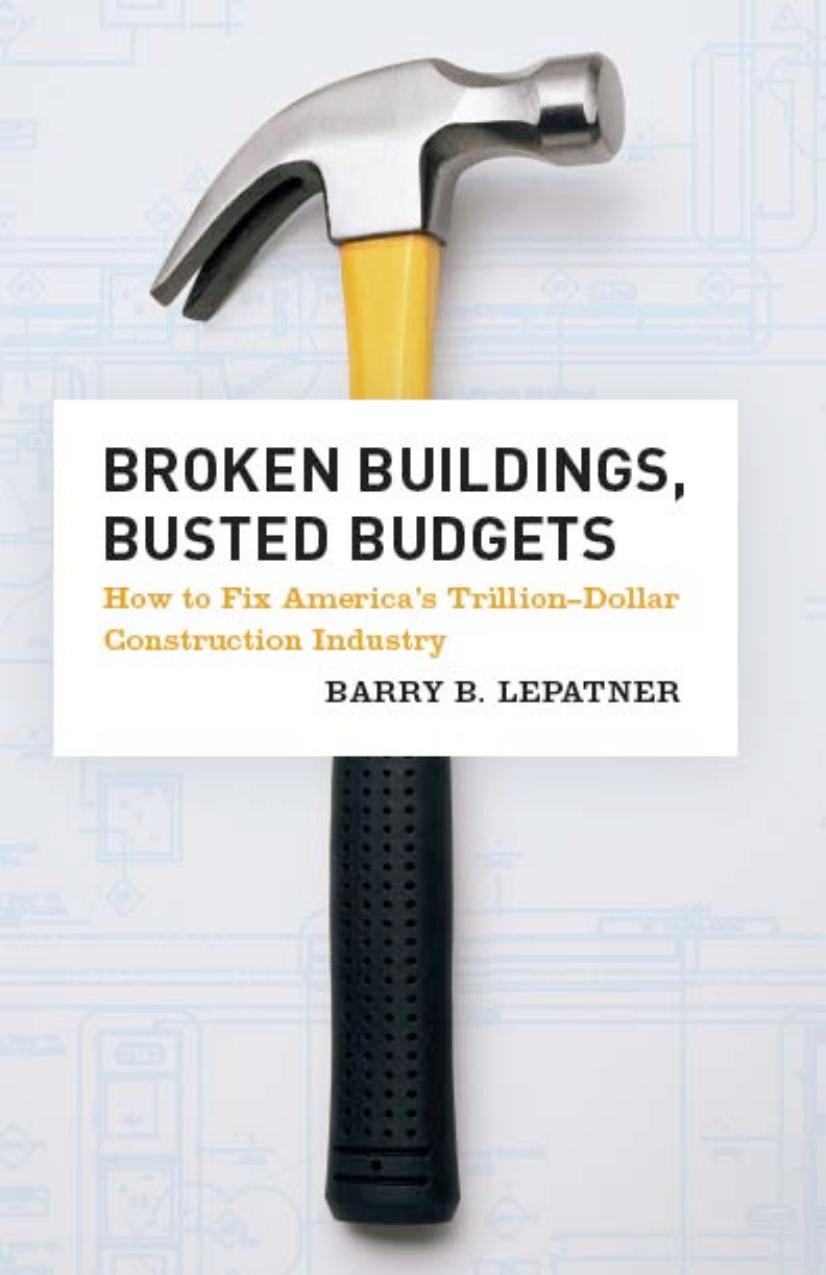Broken Buildings, Busted Budgets: How to Fix America's Trillion-Dollar Construction Industry by Barry B. LePatner

Author:Barry B. LePatner [LePatner, Barry B.]
Language: zho
Format: epub, pdf
Tags: #genre
Publisher: University of Chicago Press
Published: 2007-10-14T16:00:00+00:00
Government Rules and Regulations: Big Headaches in Small Packages
Government regulations at the local, state, and federal levels have historically impeded change in the construction industry and continue to do so to this day. In other industries with big powerful firms, economically inefficient government restrictions have been swept aside by intensive lobbying efforts. Not so in construction, where small firm size leads to a free rider problem that makes it difficult for the industry, big as it is in the aggregate, to apply sufficient reform pressure in Washington, or even in state capitals.34
The problem intensified in the postwar period as state and federal laws and regulations increasingly affected construction. By 1980, one study included a chapter called “The Stultifying Role of Government,” which asked readers to “consider the range of regulatory areas that affect construction”: accessibility for the handicapped, aesthetics, boilers, consumer protection, demolition, environmental protection, explosives, financing, flood plains and wetlands, food handling, fuel storage, historic districts, liability, material and equipment acceptance, sanitary and storm sewers, streets and roads, signage, soil conservation, wages, and more.35
Everyone associated with the process of purchasing land and building on it over the last twenty-five years knows that regulation has grown exponentially. Though benign relative to other places, there is little doubt that the current system of government regulation of construction is repressive enough to impede U.S. productivity growth. According to construction economists, “many current regulations are superfluous or redundant, and regularly stifle the entrepreneur’s incentives to develop systems and build infrastructure that is cheaper, safer, or quicker to construct and maintain.”36 Entrepreneurs are too busy filling out forms to implement good ideas. A recent study found that small construction firms spend twenty-one weeks per year to complete government paperwork. That is twice the national average for small firms.37
Still unconvinced? Consider the following, written by a government task force: “New York City’s byzantine building code makes the required permit processes lengthy and frustrating. Permits for building plans, demolition, construction, hoisting, etc., require inspections and approvals from a large number of agencies, including the City Planning Commission, the Department of Environmental Protection, the Buildings Department, the Fire Department, the Department of Transportation, the Landmarks Commission and the Bureau of Highways.”38
Ever stay in a New York hotel? In addition to the city’s explicit hotel tax, guests in every Manhattan hotel pays hidden taxes that recoup the extra costs of erecting buildings in an over-regulated jurisdiction. Though the magnitude varies over time and place, every American—every time he or she uses a building or a road (bridge, tunnel, etc.) or electricity or factory-made products—pays this implicit tax.39 As builder Sam Lefrak has said, “The legislators have legislated us into the ground.”40
Local building codes, which number in the thousands across the country, create a patchwork of regulations that, in effect, prevent construction firms from expanding, because they are afraid to risk working in jurisdictions where they are unfamiliar with the intricacies of the codes and the code inspectors. The latter is an important consideration because even where the codes are identical, their interpretations can vary widely.
Download
Broken Buildings, Busted Budgets: How to Fix America's Trillion-Dollar Construction Industry by Barry B. LePatner.pdf
This site does not store any files on its server. We only index and link to content provided by other sites. Please contact the content providers to delete copyright contents if any and email us, we'll remove relevant links or contents immediately.
Life 3.0: Being Human in the Age of Artificial Intelligence by Tegmark Max(5535)
The Sports Rules Book by Human Kinetics(4373)
The Age of Surveillance Capitalism by Shoshana Zuboff(4272)
ACT Math For Dummies by Zegarelli Mark(4038)
Unlabel: Selling You Without Selling Out by Marc Ecko(3640)
Blood, Sweat, and Pixels by Jason Schreier(3600)
Hidden Persuasion: 33 psychological influence techniques in advertising by Marc Andrews & Matthijs van Leeuwen & Rick van Baaren(3538)
The Pixar Touch by David A. Price(3424)
Bad Pharma by Ben Goldacre(3414)
Urban Outlaw by Magnus Walker(3382)
Project Animal Farm: An Accidental Journey into the Secret World of Farming and the Truth About Our Food by Sonia Faruqi(3208)
Kitchen confidential by Anthony Bourdain(3075)
Brotopia by Emily Chang(3045)
Slugfest by Reed Tucker(2991)
The Content Trap by Bharat Anand(2912)
The Airbnb Story by Leigh Gallagher(2835)
Coffee for One by KJ Fallon(2619)
Smuggler's Cove: Exotic Cocktails, Rum, and the Cult of Tiki by Martin Cate & Rebecca Cate(2514)
Beer is proof God loves us by Charles W. Bamforth(2441)
